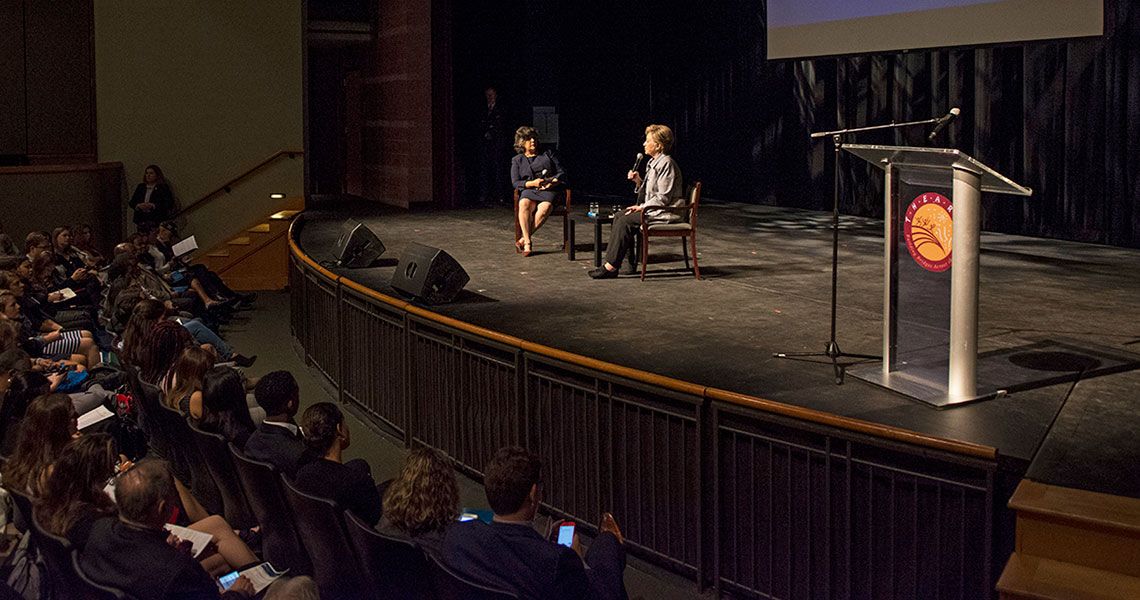In 1902, Justina Ford, MD, set up a medical practice in her Colorado home after being told she could not work in the local hospitals because she was an African American and a woman. However, she did not let that stop her from serving the people in her community, delivering 7,000 babies during her 50-year career.
She surely got discouraged many times over the course of those 50 years, said Jehan “Gigi” El-Bayoumi, MD, RESD ’88, founding director of the Rodham Institute and professor of medicine at George Washington University’s School of Medicine and Health Sciences, at the start of the 5th Annual Rodham Institute Summit, held Nov. 3 at THEARC in southeast Washington, D.C.
That kind of fortitude, El-Bayoumi continued, is why “whenever we’re feeling bad, whenever we’re feeling discouraged, we need to remind ourselves that there are many Dr. Justina Fords who came before us.”
The theme of this year’s summit was “Building and Strengthening Resilience in Our Community.” The summit’s message was reflected by keynote speaker Hillary Rodham Clinton, former senator and secretary of state, whose mother, Dorothy Rodham, inspired the creation of the institute. GW President Thomas J. LeBlanc introduced Clinton, remarking on her four decades in public service and her longtime advocacy for human rights, democracy, and civil society. "She has been an advocate for underserved communities her entire career," he said.
The mission of the institute is improving health equity in Washington, D.C., through community collaborations, health education, and service learning.
Clinton’s mother embodied resilience. Raised in a loveless household, Rodham fled her home at the age of 14 to work as a housekeeper and babysitter in an effort to find a better life, and in spite of her past, she grew to become a caring and thoughtful mother and friend.
“My mother told me along the way of this very difficult childhood that there were people who showed kindness to her, and I think that’s right in line with the theme of building and strengthening resilience,” Clinton said. “I personally think kindness is one of the most important gifts you can give someone to help them feel like they’re worthy, like they’re important.”
Clinton asked the audience members, “What can we as a community do to help people overcome their challenges? Everyone has something in their lives that knocks them down, how do we help them get back up?”
Clinton said that begins with future generations. “I really believe you start with young people and … recognize that they not only can learn something about their own health, but actually be ambassadors about health to people in their families or people around them.
“I am absolutely sure that we can build in more individual resilience and more community resilience and, facing what we face in our own country today, we can build in more national resilience,” Clinton added. “But it takes effort, it takes work … it takes the kind of interventions and information and education and pathways and opportunities that [Rodham] is trying to provide.”
In addition to the talk from Clinton, the summit also featured community panels. The first featured Ruth Watson Lubic, founder and president emerita of the Developing Families Center, and Almeta Keys, MEd, MDiv, executive director of the Edward C. Mazique Parent Child Center.
The second panel, “Building a Resilient Community,” focused on the efforts of community members in D.C.’s Wards 7 and 8 to form partnerships and collaborations to achieve better health outcomes.
“It’s a big tent, and we want as many people who are interested in better health outcomes … to get in the tent, because we need each and every one of you to help,” said Calvin Smith, chair of the Ward 8 Health Council and director of government and community relations at BridgePoint Healthcare. “We’re trying to break down silos.”
Rev. Deborah K Webb, MDiv, founder and CEO of DKWebb Ministries, agreed with Smith’s tent analogy. “As pastors we have been strengthening, building, and rebuilding resiliency in communities for decades, certainly in Ward 8,” she said. “That’s why we come together under the tent … this is a collaboration to see if we can help to mitigate some of the social determinants of health.”
She said that includes working with primary care and behavioral health practitioners in underserved communities to destigmatize mental health disorders and help people not just physically but mentally.
In addition, Rev. Kendrick E. Curry, PhD, MDiv, senior pastor at Pennsylvania Avenue Baptist Church, spoke about his vision to make his church a “one-stop shop” that features a clinic or day hospital that would serve the congregation.
“We’ve been dabbling in health, dealing with issues in and around our community,” he said. “The reality of it is, many [people] don’t have primary health care. Their primary care is going to the emergency room.
“What we need is your support,” he added. “We need people to come out, and volunteer, and to be able to say ‘I’m willing to put my hand in your hand,’ and we can work together to build better collaborations.”



